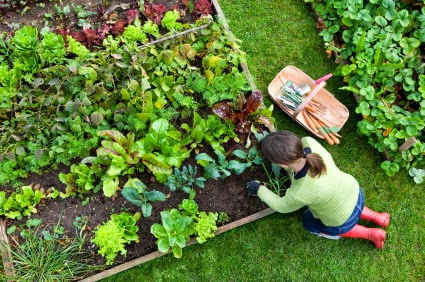Organic Gardening: 10 Tips to Success
 Organic gardening is the method of gardening that utilizes only materials derived from living things, ie. all natural plant foods and pesticides. Once you know the basic tenets of this practice, organic vegetable gardening is simple. And the payoff is enormous: no toxic chemicals, no waste, better for the environment as a whole, and not to mention a crop full of natural, delicious vegetables. Remember these 10 steps and you’ll have a successful crop in no time!
Organic gardening is the method of gardening that utilizes only materials derived from living things, ie. all natural plant foods and pesticides. Once you know the basic tenets of this practice, organic vegetable gardening is simple. And the payoff is enormous: no toxic chemicals, no waste, better for the environment as a whole, and not to mention a crop full of natural, delicious vegetables. Remember these 10 steps and you’ll have a successful crop in no time!
Soil. It all begins here. Amending your soil with organic material such as composted manure or yard and kitchen scrap compost will get your dirt off to a good start. The inclusion of organic material provides a solid basis of nutrients for your plants which helps to cut down on the need for commercially made fertilizers and improves soil structure making it easier for your plant to absorb the important minerals they need. Sandy soil will not hold its moisture well. Heavy clay soil may prove too dense for healthy root development.
Fertilizer. In addition to compost, your plants will enjoy a healthy dose of other organic foodstuffs like worm poop and pee (we call this worm tea), eggshells, Epsom salts, bone meal, blood meal…the list goes on, but the key word is all-natural. Mother Nature knows what she’s doing and these sources provide essential vitamins and minerals for your plants.
Beneficial insects. When planning your garden, educate yourself on which plants repel insects, which plants invite them, and what each bug eats. For instance, ladybugs eat aphids, which is a good thing because aphids will suck the life from just about any plant! By inviting ladybugs into your garden you are employing a natural form of pest control and not toxic chemicals.
Layout. When designing your garden, it’s important to adhere to spacing guidelines for your plants. By keeping them close, their leaves will shade the ground beneath them. This not only cuts down on weed growth, but also helps the soil retain water, cutting down on water usage. Organic gardeners are excellent custodians of the environment. Too close, and you’ll invite the growth of fungus and disease.
Companion planting. Including a wide variety of plants in your garden and planting them according to their relationship with others helps in many ways. For instance, bean plants fix nitrogen into the soil, which corn plants use to produce healthy cobs. Corn provides support for the climbing vines of the bean family. Add squash to the base and you have instant weed control!
Crop rotation. This is the practice of rotating a plant’s location from season to season. Relocating your plants cuts down on soil depletion and disease infestation. In addition, plants like beans will actually put nutrients into the soil that can be used by the next crop, ie. corn. Disease will be reduced because the organisms that infect one plant pose no harm to the next, so rotating eliminates the likelihood a disease will spread.
Water. Conserving water is a key component of organic gardening. Good watering practices include the capturing and storing of rain, the use of drips hoses, and plenty of mulch. With a sprinkler system, a large amount of water can be lost to evaporation. If sprinklers must be used, it’s best to water in the early morning or early evening hours. Using mulch around your plants is another way to conserve water because it keeps the soil moist longer, requiring less water to be used.
Weeds. Weed removal is best done by hand, without the use of chemicals. While tedious, this duty can be cut down tremendously by the use of smart planting. Remember, keeping plants close helps prevent weed growth. Natural mulch is another great method. Not only does it help prevent weeds, it has the added benefit of providing nutrients into the soil as it breaks down.
Cover crops. These are the plants you grow in between seasons. They help to replenish the soil with vital nutrients and prevent soil erosion. They can also be used to feed the beneficial insects in the absence of your vegetable crop and keep weeds at bay.
Seeds. Organic gardening is all about using sustainable methods and what better way to be self-sustaining than to use your own seeds! The practice of saving seeds has been around for centuries and ensures you “know what you grow.” But to ensure purity and avoid cross-pollination, you must keep some distance between the same plants of different varieties. You don’t want to be disappointed when you plant those tomato seeds next year and discover the result is a hybrid–and not the decadent beefsteak tomato you were looking forward to. Only heirlooms can produce the original fruit, not hybrids.
Organic vegetable gardening is all about sustainable practices. It’s conservation at its best, because you are using what you have and what you can find in nature. From fall leaves to leftover food, you waste nothing in an organic garden. Plants help each other, insects play a role…why even Mother Nature helps by delivering an extra shot of nitrogen in every rain drop!
But more than being a good steward of the environment, organic gardening makes for a healthier you.